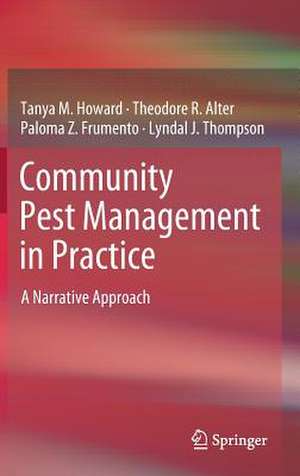Community Pest Management in Practice: A Narrative Approach
Autor Tanya M. Howard, Theodore R. Alter, Paloma Z. Frumento, Lyndal J. Thompsonen Limba Engleză Hardback – 22 ian 2019
Preț: 378.64 lei
Nou
Puncte Express: 568
Preț estimativ în valută:
72.45€ • 75.65$ • 59.83£
72.45€ • 75.65$ • 59.83£
Carte tipărită la comandă
Livrare economică 11-17 aprilie
Preluare comenzi: 021 569.72.76
Specificații
ISBN-13: 9789811327414
ISBN-10: 9811327416
Pagini: 140
Ilustrații: XXIV, 233 p. 8 illus.
Dimensiuni: 155 x 235 mm
Greutate: 0.54 kg
Ediția:1st ed. 2019
Editura: Springer Nature Singapore
Colecția Springer
Locul publicării:Singapore, Singapore
ISBN-10: 9811327416
Pagini: 140
Ilustrații: XXIV, 233 p. 8 illus.
Dimensiuni: 155 x 235 mm
Greutate: 0.54 kg
Ediția:1st ed. 2019
Editura: Springer Nature Singapore
Colecția Springer
Locul publicării:Singapore, Singapore
Cuprins
Foreword.- A. Introduction.- i. The context of invasive species management in Australia.- ii. Theoretical framing: knowledge, power and collective action.- iii. Developing and using narratives.- B. Part One: First person narratives.- iv. Introduction.- v. 12 practitioner profiles.- vi. Analysis.- vii. Conclusions: practitioner action for invasive species management.- C. Part Two: Wild dog groups – 3 case studies.- viii. Introduction.- ix. Case study narratives.- a) Mt Mee.- b) Ensay/Swifts Creek.- c) Northern Mallee.- x. Comparative Analysis.- xi. Conclusions: community action for wild dog management.- D. Part Three: Learning from stories of practice.- xii. What are the lessons for personal practice?.- xiii. What are the lessons for collective action?.- xiv. Conclusions.
Notă biografică
Tanya M Howard is a post-doctoral research fellow at the University of New England where she teaches natural resource management, community engagement and environmental policy and maintains research links with Pennsylvania State University and the Kettering Foundation in the USA. Her research explores how community voices and rural communities are brought into processes of environmental governance. This includes case studies of collective community action in wild dog management, capacity building and network development for invasive species community practitioners, collaborative policy and program reform for community action on biosecurity management and in-depth relationship development, research practice and community building with collaborators across Australia. Tanya has worked with rural and remote communities to develop and deliver quality natural resource management and environmental sustainability outcomes across the non-government to government sectors. She holds a Bachelor of Arts, a Masters in Environmental Education and a PhD in natural resource governance. Tanya is passionate about the role of communication, deliberative practices and community participation in the pursuit of environmental and social justice.
Theodore R. Alter is Professor of Agricultural, Environmental and Regional Economics in Pennsylvania State University's Department of Agricultural Economics and Rural Sociology. He is also Co-Director of the Center for Economic and Community Development. Theodore is Penn State's premiere engagement scholar; engagement and engaged scholarship are key dimensions of his research, teaching and public service. He championed rewarding faculty for outreach scholarship, collaborated with state organisations, has served as Director of Penn State Cooperative Extension and on the boards of the Journal of Community Engagement and Scholarship and the Journal of Higher Education Outreach and Engagement. Previously Theodore was Penn State's Associate Vice President for outreach, Associate Dean of the College of Agricultural Sciences and Director of Penn State Cooperative Extension. He has a Bachelor's degree in economics from the University of Rochester, and a Masters and Doctorate in resource economics and policy from Michigan State University where he was also a National Defense Education Act Fellow.
Paloma Z. Frumento is a Research Associate with the Department of Agricultural Economics, Sociology and Education at Penn State’s College of Agricultural Sciences. Her career is animated by a desire to catalyse and support cross-cultural communication and collaboration: she has worked on an intercultural bilingual education program in Ecuador, a rural library development project in Kenya, and an agricultural engineering extension initiative in Senegal and the Gambia. Paloma holds a B.A. from Columbia University.
Lyndal J. Thompson is a Senior Policy Officer at the Australian Government Department of Education and Training and an applied agri-environmental researcher. Her research foci includes community development, adult education, agricultural extension and the social psychology of decision-making. Lyndal holds a Bachelor of Natural Resources (Hons) and a Doctorate from the University of New England, Armidale, NSW.
Textul de pe ultima copertă
This book presents a collection of practitioner and community stories that reveal how invasive species management is a community issue that can spark community formation and collective action. It combines the unique first-person narratives of practitioners on the frontline of invasive species management in Australia with three case studies of community action for wild dog management across a range of geographical landscapes. The book offers readers a new understanding of how communities are formed in the context of managing different species, and how fundamental social and political processes can make or break landholders’ ability to manage invasive species. Using narrative analysis of practitioner profiles and community groups, drawing lessons from real-world practices, and employing theories from community development, rural sociology and collective action, this book serves multiple functions: it offers a teaching tool, a valuable research contribution, and a practitioner’s field guide to pursuing effective community development work in connection with natural resource management, wildlife management and environmental governance.
Caracteristici
Re-frames invasive species management as a community problem that requires community action Presents engaging narratives on community engagement in the context of invasive species management Reconnects technical practice and human practice in invasive species management
